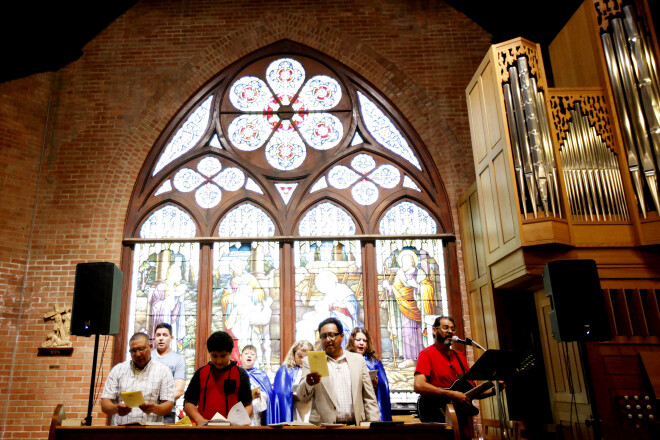God Speaks

Exodus 3:13-16
13 Moses said to God, “Suppose I go to the Israelites and say to them, ‘The God of your fathers has sent me to you,’ and they ask me, ‘What is his name?’ Then what shall I tell them?”
14 God said to Moses, “I am who I am.[c] This is what you are to say to the Israelites: ‘I am has sent me to you.’”
15 God also said to Moses, “Say to the Israelites, ‘The Lord,[d] the God of your fathers—the God of Abraham, the God of Isaac and the God of Jacob—has sent me to you.’
“This is my name forever,
the name you shall call me
from generation to generation.”
The Bible contains many kinds of writings, and it does many things: conveys the history of Israel, gives practical wisdom advice, presents moral laws, etc. But the first thing it does, throughout the sweep of its different books, is to tell the reader who God is. It communicates His identity. In the language of the Bible, it gives us his name. It must do this, since human beings imagine who God is in a myriad of ways. Simply the word ‘God’ does not yet tell us this, and that word alone could be easily misunderstood.
So in the pivotal chapter 3 of Exodus, God finds Moses though he tries to hide in the desert with his in-laws. He appears in His creation, yet miraculously, in the burning bush. He tells Moses that He cares for His oppressed people and means to act to redeem them in history. He confirms that He is the same God known to their ancestors. Each of these facts says something about who He is.
But most of all, He tells Moses that He is YHWH, the utterly free God, alive, sovereign: ‘I am who I am.’ He alone constitutes Himself, and is subject to no necessity. He chooses to give them His name. And this disclosure of who He is takes place not only in Exodus3, but throughout the whole Bible. This God of the fathers, of the Exodus, of Zion, the first and the last, is the God embodied and revealed in Jesus Christ. We have already learned in our catechism that we can discern hints of who God is, but only as we read the Bible can we be taught who God truly is. In the past God spoke to our ancestors through the prophets at many times and in various ways, 2 but in these last days he has spoken to us by his Son, whom he appointed heir of all things, and through whom also he made the universe. 3 The Son is the radiance of God’s glory and the exact representation of his being, sustaining all things by his powerful word. (Hebrews 1: 1-3)
But how do we learn who God is? He tells us. God speaks to us. The ‘Word of the Lord’ that came to the prophets still speaks through the Scriptures. In other words, they do not only convey information. As they do so, He Himself still speaks, through these words.
Now words tell the heart (unless the speaker is dissembling, which God does not do). The speaker has the initiative. They cannot be possessed and controlled in the same way things can be (though we try!) Now God is unique in that His Word actually brings about what He says. We have seen this in the very word “dabar”in Hebrew which can mean ‘word’ or ‘deed.’ ‘And God said ‘let there be light,’ and there was light.’
sMany things follow from what we have said. But this is the place to start: God speaks; we hear His voice through the Scriptures; in this hearing He conveys who He is; His Word can accomplish what it communicates.
Sing ‘Thou whose Almighty Word’
Why do people in church seem like cheerful, brainless tourists on a packaged tour of the Absolute? … Does anyone have the foggiest idea what sort of power we blithely invoke? Or, as I suspect, does no one believe a word of it? The churches are children playing on the floor with their chemistry sets, mixing up a batch of TNT to kill a Sunday morning. It is madness to wear ladies’ straw hats and velvet hats to church; we should all be wearing crash helmets. Ushers should issue life preservers and signal flares; they should lash us to our pews. For the sleeping god may wake someday and take offense, or the waking god may draw us to where we can never return.”
—Annie Dillard, Teaching a Stone to Talk



